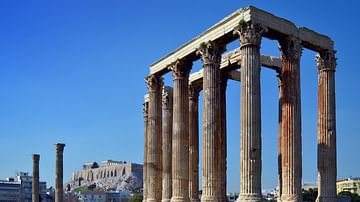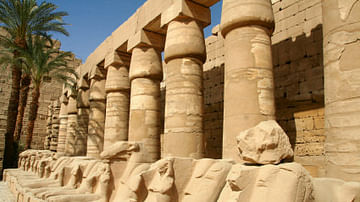Search
Search Results

Video
Unknown sculptor, Venus, 4th century B.C.E.
More free lessons at: http://www.khanacademy.org/video?v=hXQa7psqSTY Unknown sculptor, Venus after the Greek original by Praxiteles from the 4th century B.C.E., Roman, 175-200 C.E. (Getty Villa) Speakers: Dr. Beth Harris, Dr. Francesca Tronchin...

Article
Jesus & the Law of Moses
New Testament studies now place Jesus Christ within the parameters of Second Temple Judaism in the 1st century CE, attempting to go behind the layers of later Christian theology and philosophy (such as the trinity) to understand how his message...

Definition
Fire Temple
Fire Temples are places of worship in the Zoroastrian religion. They were known as ataskada (“house of fire”) by the Persians but are best known today by their Greek name pyratheia (fire temple). They are thought to have originated from the...

Definition
Bulguksa Temple
The Bulguksa Temple (aka Pulguk-sa Temple or 'Temple of the Buddha Land') was built in the 8th century CE on the wooded slopes of Mt. Tohamsan at the ancient Silla capital of Geumseong (modern Gyeongju, South Korea). The Buddhist temple...

Definition
Roman Mythology
The ancient Romans had a rich mythology and, while much of it was derived from their neighbors and predecessors, the Greeks, it still defined the rich history of the Roman people as they eventually grew into an empire. Roman writers such...

Definition
Vulcan
Vulcan or Volcanus was the Roman god of fire and forge, the equivalent of Hephaestus from Greek mythology. The son of Jupiter and Juno, he was the special patron of blacksmiths and artisans. As the god of the forge and the devastating fire...

Article
Temple of Olympian Zeus, Athens
The Temple of Olympian Zeus in Athens, also known as the Olympieion, was built over several centuries starting in 174 BCE and only finally completed by Roman emperor Hadrian in 131 CE. Its unusually tall columns and ambitious layout made...

Definition
Claudius Ptolemy
Claudius Ptolemy (c. 100 to c. 170 CE) was an Alexandrian mathematician, astronomer, and geographer. His works survived antiquity and the Middle Ages intact, and his theories, particularly on a geocentric model of the universe with planets...

Definition
Titian
Titian (c. 1487-1576 CE), real name Tiziano Vecelli (or Vecellio), was an Italian Renaissance painter who during his lifetime was considered the finest of the Venice school of artists. In a long career working for dukes, kings, and popes...

Definition
Karnak
Karnak is the modern-day name for the ancient site of the Temple of Amun at Thebes, Egypt. The Egyptians called the site Nesut-Towi, "Throne of the Two Lands", Ipet-Iset, "The Finest of Seats" as well as Ipt-Swt, "Selected Spot" also given...